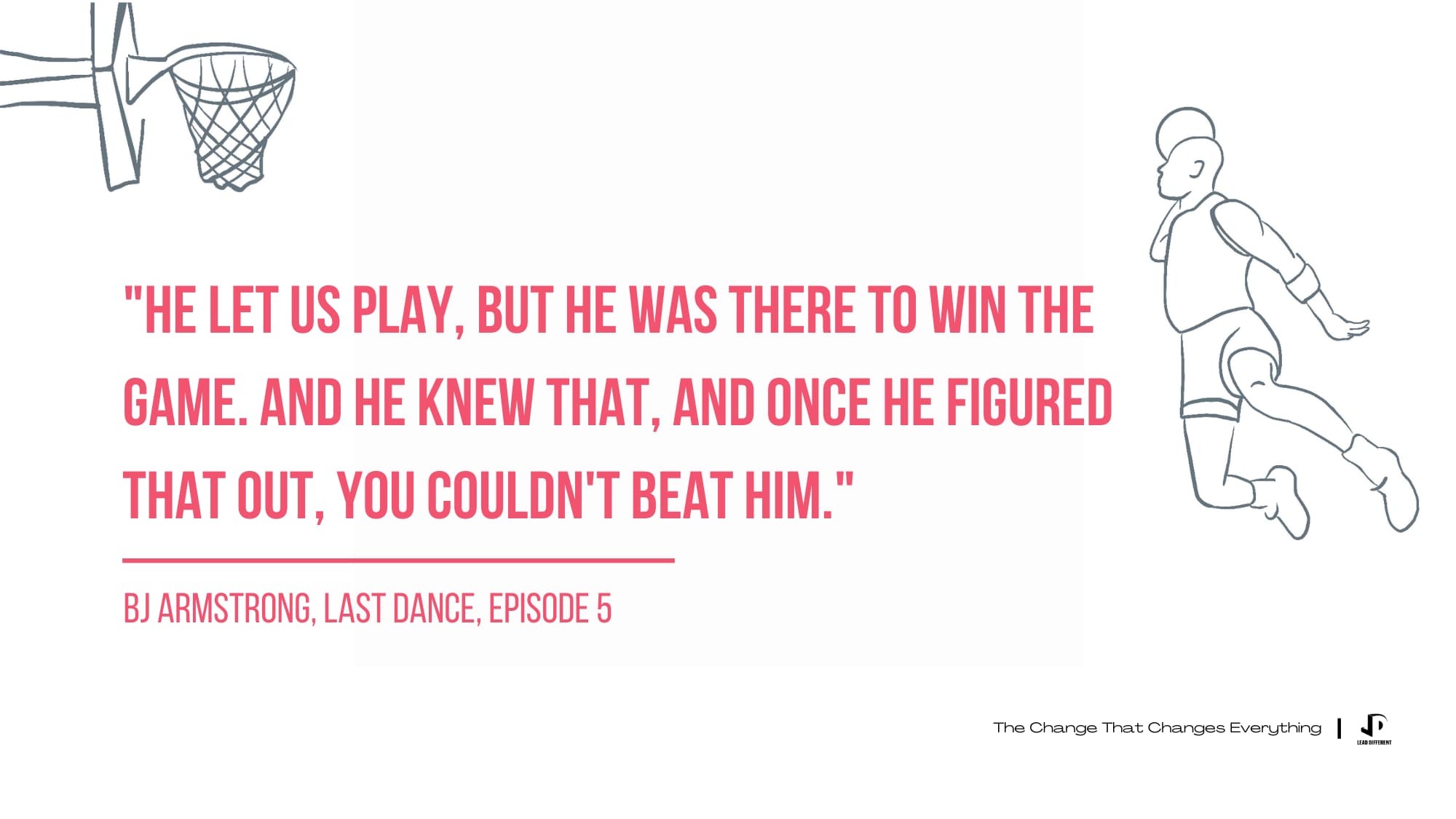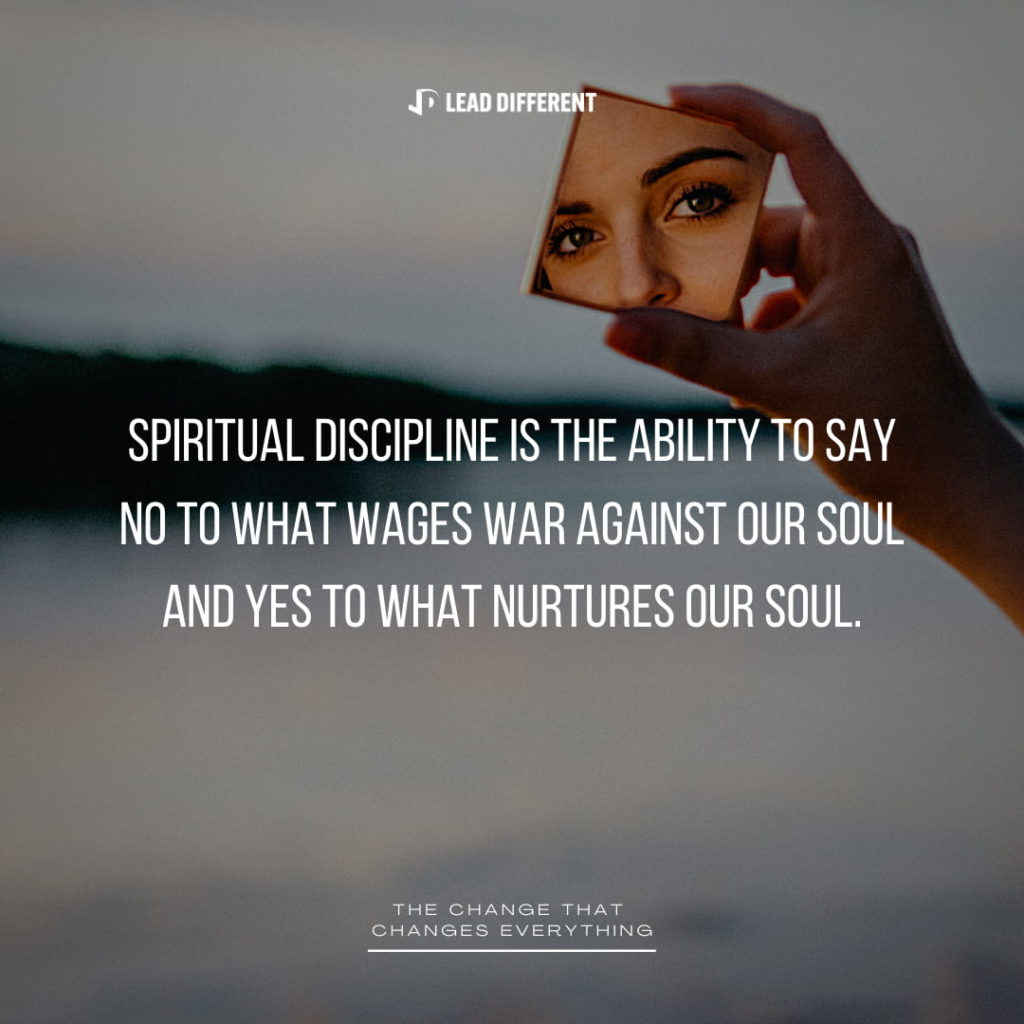
The Change That Changes Everything
November 6, 2020
Russ Ewell
He stopped playing basketball. He was just there to win the game. Once he figured that out you couldn’t beat him.’
BJ Armstrong, Last Dance, Episode 5
The change that changes everything is discipline. Before you develop an allergic reaction to the word discipline, give my definition a chance.
The kind of discipline we are talking about is complete and holistic, as Oxford Dictionary defines it: “characterized by comprehension of the parts of something as intimately interconnected and explicable only by reference to the whole.”
BJ Armstrong describes this type of discipline within the confines of basketball when he explains how Michael Jordan “stopped playing basketball,” then went on to say, “He was just there to win the game.”
Mr. Armstrong is saying basketball was no longer about the individual fundamentals (dribbling, shooting, passing, rebounding, defense) for Jordan, nor was it about the game preparation provided by coaching schemes or opponent analysis. Whether the game was played at home or away became irrelevant – everything came together as one.
Mr. Jordan saw the game as a whole rather than separate parts, and as Mr. Armstrong explained, “Once he figured that out you couldn’t beat him.”
Starting with that season, I felt Michael Jordan never played basketball anymore. He just figured out how to win the games. He knew how to steer momentum. He knew how to get guys going. And not only was he that good on the offensive end, he was just as good on the defensive end.
So he was just playing a different game than the rest of us. He let us play, but he was there to win the game. And he knew that, and once he figured that out, you couldn’t beat him.
BJ Armstrong, Last Dance, Episode 5
When thinking about how to apply this complete or holistic discipline to life beyond the game of basketball, we must ask ourselves the question, ‘What are the individual aspects of life, and how do we discipline them in such a way that they become one, where we make ourselves unbeatable like Jordan by figuring out how to stop merely living, and start winning?’
This new definition of discipline (at least to me) identifies 4 individual aspects of life.
- Emotional
- Spiritual
- Mental
- Physical
Complete or holistic discipline requires the application of discipline not to one but all 4 aspects of life. It requires seeing these foundational aspects of life as one the same way Jordan experienced the foundational aspects of basketball as one.
Developing this type of complete or holistic discipline in our lives is ‘the change that changes everything’.
The Change That Changes Everything
What one thing could you do in your personal and professional life that, if you did it on a regular basis, would make a tremendous positive difference in your life?
Stephen R. Covey, The 7 Habits of Highly Effective People
Focus is always a challenge for me. Perhaps you can relate. For this reason, I find myself returning to Stephen Covey. His question, “What one thing could you do in your personal and professional life that, if you did it on a regular basis, would make a tremendous positive difference in your life?” has always helped me focus.
As I prepared to embark on my 52- and 66-day Change Challenge (I will explain later) this question narrowed, becoming more powerful as I asked myself, ‘What one thing in my life, if changed, would change everything?’

The list of possibilities became so numerous there was a danger my time would be spent identifying rather than changing. Finally, after meditating, reflecting, praying, and studying, illumination occurred.
Everything on my incomplete yet lengthy list required some level of discipline, but not the traditional discipline of scheduling, tardiness, list-making or follow-up. This was different. Some items would require mental or intellectual discipline, others emotional discipline, still others spiritual discipline, and finally physical discipline would be necessary to sustain any of these efforts.
My epiphany was complete. Rather than become overwhelmed by a long list of changes, if I could develop complete or holistic discipline, this one change would make all other changes possible.
Emotional Discipline: Turning Motion Into Action
It is easy to get bogged down trying to find the optimal plan for change: the fastest way to lose weight, the best program to build muscle, the perfect idea for a side hustle. We are so focused on figuring out the best approach that we never get around to taking action.
James Clear, Atomic Habits
When “we are so focused on figuring out the best approach that we never get around to taking action,” we lack emotional discipline, the discipline of the heart. James Clear describes the emotionally undisciplined as people of motion rather than action.
I refer to this as the difference between being in motion and taking action. The two ideas sound similar, but they’re not the same. When you’re in motion, you’re planning and strategizing and learning. Those are all good things, but they don’t produce a result.
James Clear, Atomic Habits
Pride prevented me from seeing my lack of emotional discipline. Each time I examined my life, there were significant levels of accomplishment which ran counter to the idea that I was a man of motion rather than action, but then I realized something. When faced with changing easy things I was a man of action, but when it came to the difficult, those deep dysfunctions or patterns of behavior etched into my character, I became a man of motion.
Action would mean resisting the emotions leading me to avoid, excuse, delay, plan, prepare, study, or otherwise deceive myself with motion when action was needed.
Action, on the other hand, is the type of behavior that will deliver an outcome. If I outline twenty ideas for articles I want to write, that’s motion. If I actually sit down and write an article, that’s action. If I search for a better diet plan and read a few books on the topic, that’s motion. If I actually eat a healthy meal, that’s action.
James Clear, Atomic Habits
Emotional discipline is the ability to say no to ourselves when we attempt to replace motion with action.

Spiritual Discipline: Nurturing The Soul
Dear friend, I pray that you may enjoy good health and that all may go well with you, even as your soul is getting along well.
3 John 1:2 NIV
Spiritual discipline is the discipline of the soul, the immaterial, mystical, physically unreachable part of us for which the seven senses have no answer. The human soul is the part of us that cries out for the deeper things of life, meaning, purpose, connection, and yes, even God.
The choices we make in life affect the health of our soul. We can make choices “which wage war against” our souls (I Peter 2:11). When we fail to discipline our soul (Psalm 69:10 Voice) we can end up lost (Proverbs 5:23 NRSV).
Interestingly, the discipline of the soul is achieved through spiritual activity like prayer, study of and obedience to the sacred scriptures, all practiced with the laser-like focus and tenacity of an athlete (I Corinthians 9:24-27 NLT).
Spiritual discipline is the ability to say no to what wages war against our soul and yes to what nurtures our soul.

Mental Discipline: Learning to Manage Yourself
History’s great achievers—a Napoléon, a da Vinci, a Mozart—have always managed themselves. That, in large measure, is what makes them great achievers. But they are rare exceptions, so unusual both in their talents and their accomplishments as to be considered outside the boundaries of ordinary human existence. Now, most of us, even those of us with modest endowments, will have to learn to manage ourselves. We will have to learn to develop ourselves.
Peter Drucker, Managing Oneself
Significant numbers of people believe they are incapable of becoming leaders. Some arrive at this conclusion before attempting to lead, while others arrive after experiencing failure in personal and public ways.
What everyone should know is all of us can lead. The key to becoming an effective leader is the same key to living an effective life, which Peter Drucker describes in two words: “Managing Oneself.”
Mental discipline is the ability to manage your life by keeping a schedule, task list, being on time, finishing on time, and keeping your life organized enough so as to not be overwhelmed by stress.
Unfortunately, a great many people with impressive resumes and extraordinary talents fail to change for one simple reason: they cannot manage themselves. Don’t take my word for it, because this was the observation of one of America’s greatest CEOs:
In the early days, I fell in love with great résumés filled with degrees in different disciplines. They could be bright and intellectually curious, but they often turned out to be unfocused dabblers, unwilling to commit, lacking intensity and passion for any one thing.
Jack Welch, Straight From the Gut
Mental discipline is the ability to say no to ourselves when we would rather be distracted, make excuses, or give in to fatigue. Instead, we choose to manage ourselves, zeroing in on the tasks at hand until we finish.

Physical Discipline: Doing What You Don’t Want To Do
Discipline is doing what you don’t want to do, when you don’t want to do it, to the best of your ability.
Bobby Knight
The cemetery of regret is filled with the living who no longer live, because they allowed their lack of physical discipline to undermine their capacity to practice emotional, spiritual, and mental discipline.
I recognize the irony of this statement given my opening quote attributed to Bobby Knight, whose critics would argue he lacked discipline. Well, in my younger years this quote helped me, so he gets credit for motivating me to grow in my discipline.
Whether we practice yoga, run marathons, lift weights, or walk, without these efforts at some point your body will bring all of your other efforts to a screeching halt, preventing change. When we discipline our body, training it to do what we want it to do even when it doesn’t want to do it, then emotional, spiritual, and mental discipline are made that much easier.

Conclusion
“The Change That Changes Everything,” is my preparation for transformative change. Beginning in a few days I will choose to take the Nehemiah 6:14-15 (52 Days) or Phillipa Lally (66 Day) change challenge.
The first is a biblical account describing how Nehemiah led the nation of Israel to rebuild the wall in 52 days despite persistent opposition. The second is new research which says we need about 66 days to make any change stick.
My goal will be to develop complete or holistic discipline. Maybe you can consider your own 52- or 66-day challenge, where you choose to build or grow in some way that months from now you will be able to see the impact of changing something that changed everything.

